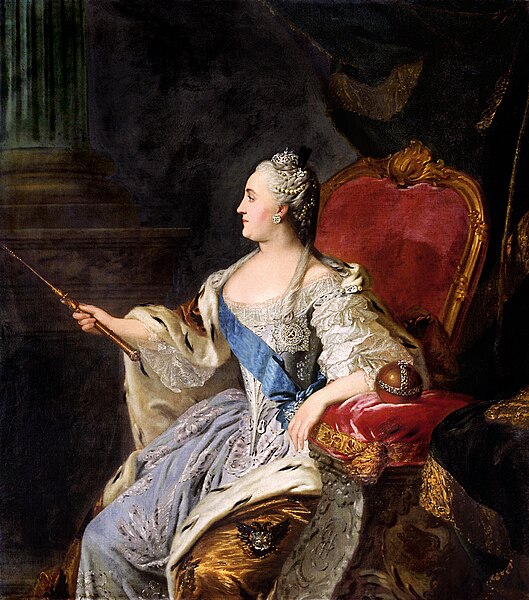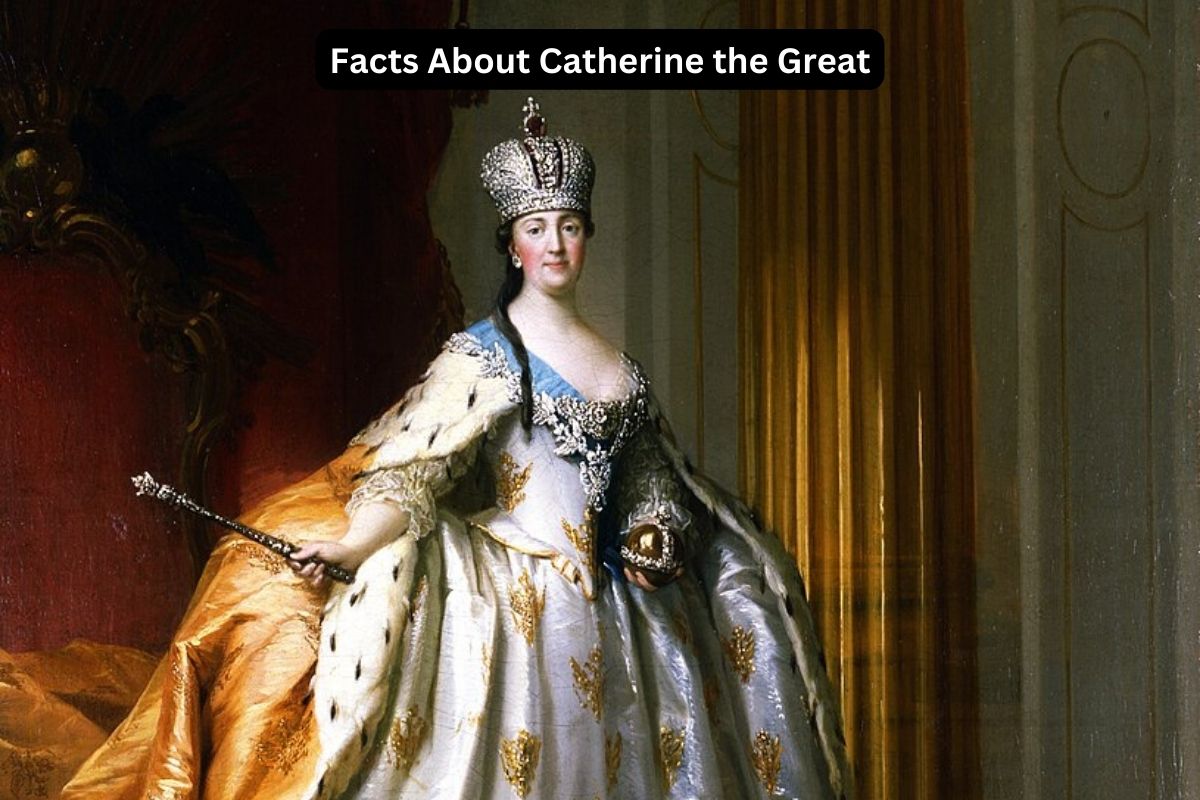Catherine the Great, also known as Catherine II, stands as one of the most iconic and influential figures in Russian history. Born into obscurity as a German princess, she ascended to the throne through a daring coup and went on to rule the Russian Empire for over three decades.
Catherine’s reign was marked by a complex interplay of Enlightenment ideals, territorial expansion, and cultural flourishing.
This article delves into the life and legacy of Catherine the Great, exploring her enlightened reforms, territorial ambitions, and enduring impact on Russian society and culture.
From her embrace of Enlightenment philosophy to her patronage of the arts, Catherine’s legacy continues to shape perceptions of Russia’s imperial past and its place in the modern world.
Catherine the Great Facts
1. Born Sophie Friederike Auguste von Anhalt-Zerbst-Dornburg in 1729
Catherine the Great was born Sophie Friederike Auguste von Anhalt-Zerbst-Dornburg on May 2, 1729, in Stettin, Prussia (now Szczecin, Poland).
She was born into a minor German noble family and received a typical education for a princess of her time, focusing on languages, music, and etiquette.

2. Married Grand Duke Peter III of Russia in 1745
In 1745, at the age of 16, Sophie married Grand Duke Peter, heir to the Russian throne and nephew of Empress Elizabeth.
Also Read: Peter the Great Timeline
The marriage was arranged as part of Elizabeth’s efforts to strengthen ties between Russia and Prussia. Sophie converted to Russian Orthodoxy and took the name Catherine upon her marriage.
3. Seized power from Peter III in a coup in 1762
Catherine’s husband, Peter III, ascended to the Russian throne in 1762 upon the death of Empress Elizabeth.
However, Peter III’s reign was marked by incompetence and unpopularity. Catherine, recognizing an opportunity, conspired with influential Russian nobles and the Imperial Guard to overthrow Peter III in a palace coup.
On July 9, 1762, Peter III was forced to abdicate, and Catherine was declared Empress of Russia. This event marked the beginning of Catherine’s illustrious reign as one of the most significant rulers in Russian history.
4. Embraced Enlightenment ideas
Catherine the Great was deeply influenced by the Enlightenment, a period of intellectual and philosophical growth in Europe.
Also Read: Accomplishments of Catherine the Great
She corresponded with leading Enlightenment thinkers such as Voltaire and Denis Diderot, and she sought to apply Enlightenment principles to her governance. Catherine believed in the importance of education and the advancement of knowledge, leading to reforms in Russia’s educational system.
She also supported religious tolerance and sought to modernize Russia’s legal and administrative systems based on Enlightenment ideals of reason and rationality.

5. Expanded Russian territory, annexing Crimea and parts of Poland
Catherine’s reign saw significant territorial expansion for the Russian Empire. One of her most notable achievements was the annexation of Crimea in 1783, which gave Russia access to the Black Sea and expanded its influence in the region.
Catherine also expanded Russia’s borders westward through a series of partitions of Poland, acquiring territories such as Belarus, Ukraine, and Lithuania. These territorial gains solidified Russia’s status as a major European power and significantly increased its population and resources.
6. Founded the Hermitage Museum
Catherine the Great was a passionate patron of the arts and culture. She played a central role in the cultural life of her empire and fostered the development of literature, music, theater, and the visual arts.
Catherine founded the Hermitage Museum in St. Petersburg in 1764, which began as her personal art collection and grew into one of the world’s largest and most prestigious museums.
Under Catherine’s patronage, St. Petersburg became a vibrant center of cultural activity, attracting artists, writers, and intellectuals from across Europe. Catherine’s support for the arts helped to elevate Russia’s cultural reputation and left a lasting legacy of artistic achievement.
7. Strengthened serfdom despite Enlightenment ideals
Despite her Enlightenment ideals and efforts at reform, Catherine did little to abolish serfdom in Russia. In fact, she took measures that further entrenched the institution. Catherine’s reign saw the implementation of laws that restricted the rights of serfs and tied them more closely to the land they worked on.
While she recognized the need for reform, Catherine prioritized the stability of the nobility, who relied heavily on serf labor for their estates. Thus, serfdom continued to be a significant aspect of Russian society throughout Catherine’s reign and beyond.

8. Created the “Nakaz,” a comprehensive legal code
Catherine oversaw the creation of the “Nakaz,” also known as the “Great Russian Law Code,” which was published in 1767. This legal code was one of the earliest attempts at codifying laws in Russia and aimed to modernize the country’s legal system.
The Nakaz drew inspiration from Enlightenment principles of justice, equality, and human rights. It sought to establish a more uniform and rational legal framework, addressing issues such as crime, punishment, and the rights of individuals.
While the Nakaz was never fully implemented, it represented a significant step towards legal reform in Russia.
9. Had numerous lovers, notably Grigory Potemkin
Catherine the Great had a colorful personal life and was known for her numerous romantic relationships. While married to Peter III, Catherine formed close bonds with several individuals, most notably Grigory Orlov and later Grigory Potemkin.
These relationships were not only romantic but also political, as Catherine’s lovers often wielded significant influence over her and played key roles in Russian politics. Despite her romantic entanglements, Catherine was a shrewd and capable ruler who maintained control over her empire.
10. Remembered as a significant and influential ruler in Russian history
Catherine the Great is remembered as one of the most successful and influential rulers in Russian history. Her reign saw significant achievements in areas such as territorial expansion, cultural development, and legal reform. Catherine’s embrace of Enlightenment ideas and her efforts to modernize Russia left a lasting impact on the country’s trajectory.
Despite criticisms of her policies, particularly regarding serfdom, Catherine’s reign marked a period of stability and prosperity for the Russian Empire. She remains a controversial figure, admired for her accomplishments yet criticized for her autocratic rule and failure to address systemic issues such as serfdom.
Nonetheless, Catherine’s legacy as a formidable ruler and patron of the arts continues to shape Russia’s cultural and historical identity.
